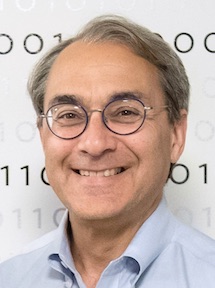By Jacob Morrow-Spitzer
Can you name something—anything—that has grown or developed to be a trillion times better than as it once previously existed? According to Alfred Spector, the Chief Technology Officer at Two Sigma Investments and a 2018-2019 Phi Beta Kappa Visiting Scholar, there is only one sole answer: the computer.
Through ΦBK’s Visiting Scholar Program—which sends leaders in the liberal arts and sciences to universities across the country to lecture in their field—Spector has laid out some of the most significant impacts of computer science and big data on modern society. Thus far, he has given lectures and led small group discussions and one-on-one meetings with students at Denison University, the University of Arizona, Rhodes College, and Valparaiso University.
Spector’s career across multiple spheres of data science has made him an expert in computing innovation, theory, and application. As an undergraduate at Harvard, he became interested in economic modeling and computing. His fascination with the budding field took him to Stanford, where he received his PhD in 1981 after writing a dissertation on the possibility and effectiveness of building computer programs on large-scale networks. After nearly a decade of teaching at Carnegie Mellon, he spent time as an entrepreneur, in product and research positions at IBM (which had acquired his company Transarc), and then as the first Vice President of Research at Google. Since 2015, Spector has returned to his original interests of using computer and data sciences as models for economic activity. At Two Sigma Investments, a data-driven hedge-fund headquartered in New York, Spector oversees all engineering at the firm and leads a team of 600 to 700 employees who, in his own words, “develop systems that gather data [which Two Sigma uses] for making decisions” to enable “the [creation of] models that make predictions, and the environments that execute those models and ultimately execute trades.”
Throughout the Visiting Scholar series, Spector has discussed both the history and growth of computer science, from its early inception to its modern applications and challenges. Between the late 1950s—when companies like IBM and Bell Labs were developing the earliest transistorized computers—and the present day, he demonstrates that the before-mentioned trillionfold performance increase (which he measures by a ratio of adjusted price to “floating point operations per second” or “FLOPS”) has not only substantially impacted countless other sectors but also invoked new questions and tribulations in the modern age of computing.
In his public lecture “Data Science: Opportunities and Challenges,” Spector discusses many of today’s pressing issues and how the technology can be both a solution and a detriment. While he admits that “we’ve been slow at looking at the challenges that new technology brings to the forefront”—particularly in regards to state-sponsored manipulation in social media—Spector also adds that many of today’s challenges go beyond the personal. Broadly, his lecture asks: “What are we trying to optimize, and is this beneficial or harmful to society? Are we helping people do what they want, or are we distracting them from what they want to do?” A close variant of Spector’s talk on Data Science, with both slides and a transcript, is available on his website.
To the students he addresses, many are acutely aware of the competitiveness of computer science classes in universities. While a recent study reported in The New York Times shows that computer science departments across the country are unable to keep up with the growing demand by students, Spector notes that computer science is also one of the most accessible fields to access outside of the classroom. In addition to a mass of how-to manuals and information on the internet relating to computing and data (the internet was created by computer scientists, after all), the only resource one truly needs to understand computer science is a computer itself.
Additionally, part of Spector’s mission is to educate non-computer science students in the field, no matter their intended area of study. He has lectured widely on “CS+X,” a term he coined at Harvard’s Center for Research on Computation and Society in 2004 that outlines the impact and importance of combining computer science with any other field “X.” Traditionally non-computer-based fields such as the humanities can be significantly altered and made more accessible with the integration of computing and data analytics (quantitative analysis as a method for historical research is one possibility that Spector provides). Yet even from a broader standpoint, he points out, the lightning-fast availably of research queries and search engines has both drastically changed the work of researchers, as well as provided instant—albeit not necessarily correct—answers to dinner table arguments. Such massive amounts of accessible data can provide an easy outlet for fake news and sources. (“If you give me any hypothesis,” Spector demonstrates, “I can most likely find evidence to support it within an hour.”)
At the four universities he has visited since October, Spector says he has thoroughly enjoyed the opportunity to both lecture to large groups and to meet with students in smaller settings, such as women majoring in computer science and Phi Society students at Denison. Additionally, he says that he has particularly enjoyed individual one-on-one conversations with computer science and data analytics majors and faculty members. Spector will conclude his Visiting Scholar tour at Mount Holyoke College on April 4th and 5th.
The Visiting Scholar Program connects successful and innovative scholars in the liberal arts and sciences to undergraduate ΦBK members across the nation. For more information see Phi Beta Kappa’s upcoming Visiting Scholar lectures.
Jacob Morrow-Spitzer is a recent graduate of Tulane University, where he majored in History and Jewish Studies and minored in Mathematics. He was inducted into the Alpha of Louisiana chapter of Phi Beta Kappa in May of 2018. He will begin his Ph.D. in History in the fall.




